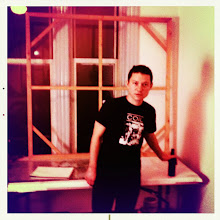(Originally, I wanted to sit down with a bottle of whiskey
and a tape recorder and see what rapturous or cantankerous speech developed as
I laid out my thoughts about drawing. Below is an approximation.)
Generically, drawing involves a pencil and paper. When examined
any further—i.e. common sense notions submitted to critical reason’s process of
elimination—drawing’s identity is as pockmarked with conditions and disclaimers
as most other visual arts media. But I’d also venture that an attempt to define
drawing as a medium, to delineate its essential characteristics, would not
result in the kind of agonistic discourse in which painting embroils its
practitioners and critics: maybe head-scratching détente or giggling free
association, instead.
Drawings, historically, were made in the service of
realizing other works—paintings, sculptures, architecture. Now drawings may
also lead to performances or installations, films or videos. Drawings were and
remain studies, sketches, notes, plans. Today a drawing might also claim some specificity,
autonomy even, but it is never really only itself. The ingrained habit remains
of assuming the idea communicated by the drawing will be applied elsewhere. Drawing’s
boon or bane, whichever, is to be always already “conceptual.” I don’t think it
would be too preposterous to claim that it is the perfect medium for our
post-medium age.
My relationship to drawing is intensely bound up in having given
up painting about five years ago, subsequently focusing exclusively on the former.
The switch triggered an avalanche of previously blocked content: stories and
histories, fears and desires, small and big ideas. I concluded that painting’s
voice is too loud, drowning out the sound of virtually everything else. The
voice of the artist typically provides 1% of the content for any given
painting. The remaining 99% consists in painting talking ceaselessly about
itself: its history, materials, conventions, the current state of the field, etc.
I hated painting for a while, the way one sometimes experiences grief over a
failed romance as strong dislike for one’s ex. Now I realize that we weren’t matched
well, we wanted different things. I’m fine now. Drawing is my boyfriend.
Maybe a drawing actually cannot achieve beatific self-reflexivity:
the world is always sneaking in, getting stuck in its craw. Drawing might fundamentally
be always about something. It’s essence might be that it is the bearer of
content, whether political program, erotic fantasy, or personal grief. I’d also
add, though, that a drawing’s content is always held at arm’s length, not only
because of the structure of representation, but also because of the
aforementioned promise of application—in the future and elsewhere, in real time
and space, in life. This is drawing’s link to magic: drawings, to quote
Burroughs’ riff on prehistoric art, are “FUNCTIONAL, intended to make things
happen, the way an atom bomb happens from Einstein’s formulae.”
P.S. I think they ought to be called “cave drawings”
instead.

No comments:
Post a Comment